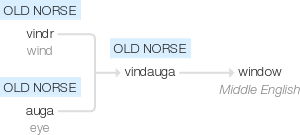Window
Middle English: from Old Norse vindauga, from vindr ‘wind’ + auga ‘eye’.
wiktionary
From Middle English windowe, windohe, windoge, from Old Norse vindauga(“window”, literally “wind-eye", "wind-aperture", "wind-hole”), i.e. ("air-hole"), equivalent to wind + eye. Cognate with Scots windae, winda, windock(“window”), Faroese vindeyga(“window”), Norwegian Nynorsk vindauga, Norwegian Bokmål vindu(“window”), Danish vindue(“window”), Swedish vindöga(“window”), Elfdalian windog and older German Windauge. The “windows” among early Germanic peoples were just unglazed holes (eyes) in the wall or roof that permitted wind to pass through (Can this(+) etymology be sourced?). Superseded Middle English fenestre, fenester(“window”) borrowed from Old French fenestre(“window”)
etymonline
window (n.)
c. 1200, literally "wind eye," from Old Norse vindauga, from vindr "wind" (see wind (n.1)) + auga "eye" (from PIE root *okw- "to see"). Replaced Old English eagþyrl, literally "eye-hole," and eagduru, literally "eye-door." Compare Old Frisian andern "window," literally "breath-door."
Originally an unglazed hole in a roof. Most Germanic languages later adopted a version of Latin fenestra to describe the glass version (such as German Fenster, Swedish fönster), and English used fenester as a parallel word till mid-16c.
Window dressing in reference to shop windows is recorded from 1853; figurative sense is by 1898. Window seat is attested from 1778. Window of opportunity (1979) is from earlier figurative use in U.S. space program, such as launch window (1963). Window-shopping is recorded from 1904.
Window shopping, according to the women, is the king of outdoor sports. Whenever a woman gets down town and has 2 or 3 hours and no money to spend, she goes window shopping. She gives the Poiret gowns and the thousand dollar furs the double O and then kids herself into believing she'd look like Lillian Russell or Beverly Bayne if she had 'em on. It's great for developing the imagination and one of the great secrets of conserving the bankroll. ... [Motor Age, Jan. 27, 1916]
